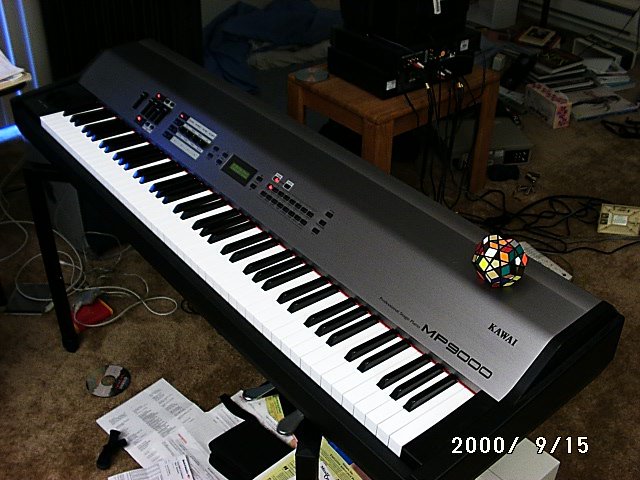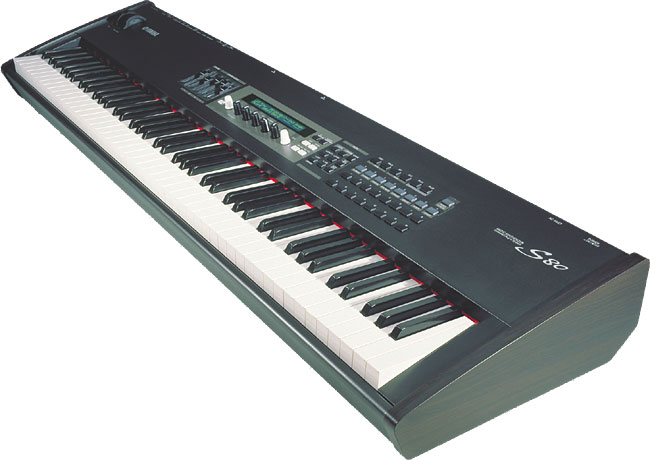Piano Keyboard Action: Kawai MP9000
Recently i sold my Kawai MP9000, and am buying a new electronic keyboard. I have narrowed down to the Yamaha s08 and the Roland fp3, both are now sitting at my home. (i'll be returning one. I highly recommend GuitarCenter.com, in their service and pricing.)
For me, and i think for any piano-music player, the key action is the most important element in choosing a 88-weighted electronic keyboard. In this message i'll be discussing more about key actions.

One of the reason i sold my mp9000 is because i'm becoming disillusioned with its key actions. Although its action feel is closest to acoustic, but there's more to a piano's key action than its feel. We have to take performance considerations, such as velocity/volume relationship or how trill can be performed. For example, suppose we have a dilapidated acoustic grand piano that has not been played for decades. Suppose this piano has just been tuned by a tuner, but no piano technician has yet to adjust its key mechanisms. Although such a piano's key feel beats any electronic keyboard, but i'm sure it won't play as well until perhaps a technician checked its key mechanics. Here we have a good example of a excellent feel that does not play well.
Of the mp9000, one common complaint is that the keys do not return as fast, so trill suffers. This i agree. The other thing i found is that the black keys has somewhat lower volume. Now this is a serious problem hard to fix.
One mp9000 owner mentioned one way to test electronic piano is to turn it off, so one can focus on the feel of the key-action alone. At first i thought this sensible, but now i think good key-action feel by itself means not much, unless one does not ever plan to turn the machine on.
Of the Yamaha s08 and Roland fp3, i'm going with the s08. I had also tested the Yamaha p-120, but i quickly decided it has the worst piano key-action (it is not possible to play piano-pianissimo (ppp) on p-120). I have also thought about considering p-200 and p-80, but p-200 is too bulky and p-80's too cheap. I had favorable impressions with the fp3, better than s08. But now having both sitting at home and playing them for hours, i find the s08 in general allow more expression.
Of the two, fp3 certainly is more piano-like. It has graded hammer effect, meaning that the left keys are heavier to press as in acoustic pianos. The s08 has equal resistant across, which i actually prefer. The fp3 keys are heavier, while the s08 is in comparison lighter. But again, repeated playing of all different scales on different keys with different touch and patten realized my preference for Yamaha s08's. It is just easier to play and easier to control volume precisely.
One interesting thing to note is that the Roland fp3 will make a sound regardless what snail-speed one presses a key. As long as the key reaches the bottom, a rather loud sound will be made. As if there are electric contact points at the bottom of the key. When the key hit bottom, a minimal sound springs forth. This is not the case for the Yamaha s08, where no sound will be generated if pressed too slow. Of this aspect, the s08's behavior is more like a acoustic. I find this aspect of the fp3 action hideous.
On key actions variety
It is interesting to note that many piano-music player shopping for a electronic keyboard have this conception that there is one true model of key-action feel, such that any digital come closest to it is the winner. This is obviously not true.
First of all, the key-feel on acoustic pianos differ rather greatly. Console, Upright, and Grand pianos of variety of sizes all have different key-feels even though all their key actions are based on elaborate fulcrum and hammer. Different models and different brands have distinct key feels, and they change over time periods as well. I have chances to touch many acoustic pianos in my life. I'm not a pianist or in piano industry, but it's well-known that even professional pianist have strong preferences among quality acoustic pianos. I read somewhere wasn't that Horowitz or Rubinstein who insists on bringing their own grand because a lighter touch?
About 8 or so recordings of Bach's Well-Tempered Clavier, the best one i prefer by far is Wanda Landowska — a harpsichordist. Landowska injected life into the harpsichord instrument, as well as its music. She designed what's called her Pleyel harpsichord, as recorded in her WTC by RCA. Buy at amazon (See: Liszt and Bach, 4 Songs to Die For.)
Of the tens of harpsichord music recordings, her harpsichord sounds unique and i like the most. It has power yet retains harpsichord clarity, with a variable twang. I think she also insisted playing her own instrument for recording. Now harpsichord coming into the picture of touch-feel context is interesting. The touch of a harpsichord is very different from piano, obviously, because its string is being plucked instead of hammered. A professional harpsichordist today is valued no less than a pianist. Obviously, to the harpsichordist, a piano's key action feel is the worst — being the action to ruin one's fingers and career. In light of this, we see it funny for electronic keyboard shoppers to debate on THE best key-action feel. (on a whim here, i imagine harpsichordist and pianist clawing each other's eyes out over THE best key-action. On a second thought, maybe organists should join in, even though organ's sustained sound is a bit of a outsider. Perhaps organist can jangle and clash with modern synth keyboardist. The winner of each category should face-off over the issue of weighted vs non-weighted keyboard once for all.)
As my thought wanders, i think we can say that different key-actions suite different types of music. There's pure elegance era a la Couperin and Bach, then there's Romantic a la maudlin Chopin and painful Liszt, or the monkey-bangs in-betweens like soporific Mozart and deaf Beethoven, and those impressionists like Debussy, then there's modern synth music a la Prince or nameless musicians.
As i have said in my previous article, the modern electronic keyboard are forward-looking in their key actions. There are many great variety of key-action feels that do not emulate acoustic keyboards such as piano or harpsichord or organ. As a recent electronic keyboard dabbler, i have tested few varieties recently, in particular Yamaha's line of models.
Yamaha's line of 88-weighted-keyboard has a few different action mechanisms. One line i would call marshmallow type, because imaginatively, its key-action feel is as if there's a marshmallow beneath the key when being pressed. You can feel this effect by pressing a key slowly. You will feel more resistance as the key reaches its bottom. The models that has marshmallow type feel includes my s08 synth, and Yamaha's Motif synth series, as well as in i think all their Clavinova series models except the cheapest ones.
I have always hated the feel of this marshmallow type. There's no momentum feel in them at all. It is so inert. But in the past few months since i looked at key-actions somewhat in depth, i find this marshmallow type _plays_ _well_, so well that i prefer it over Kawai mp9000's “life-like” key-touch i owned over 2 years, or the love-first-sight Roland fp3. (i was attracted to the fp3 by its elegant looks.)
The Yamaha p-120's key-action is not the marshmallow type. Apparently Yamaha created a new key-action for their digital piano.
The Yamaha s80 synth as i have mentioned in my previous article has this very weird interesting key feel. The whole feel is just weird, i recommend pianist to try it out at least for fun. Banging on the keys feels as if perhaps squeezing orange, or stepping on some type of modern pliable plastic. This is unlike any keyboard i've touched. Very intriguing. I'd love to test this keyboard's action for long durations.

Today i came across a guy who built a harpsichord entirely out of Lego toy blocks. Henry Lim: http://www.henrylim.org/Harpsichord.html imagine the dedication. Amazing!
there's this harpsichord history page by John Sankey
http://www.sankey.ws/history.html
here's my favorite quote from that page: “Essentially, use of the harpsichord ceased by 1800. The precision and clarity of the baroque had been replaced by mush and bombast.”
See also Wikipedia: Harpsichord.
Harpsichord sound is in fact a favorite of mine. My favorite piano-like percussion sound, among electric pianos and bells and vibraphones and music boxes and harps and guitars and etc is the steel-bright piano. On the Yamaha s08, it's called Dance Piano (preset #6). The Kawai mp9000 calls it Rock Piano. On the Roland fp3 it's piano #3 (too muddy). I prefer it so bright that it would be a mix between harpsichord and piano. When the low bass note of a piano is hit hard, as in Chopin opus 28 prelude 24's ending recorded by Martha Argerich. It should sound like a steel. (is the brightness of piano sound related to it's string tension? Can any piano connoisseur tell me which piano make makes bright-sounding piano?)
“Martha Argerich plays Chopin preludes” Buy at amazon
This piece together with the right piano sound, can kill a man.
The absolutely worst piano sound in the world is Steinway and Sons.
Piano Keyboard Action
- Piano keyboard actions: Acoustic vs Modern Weighted
- Weighted keyboard actions: Digital Piano vs Synthesizer
- Weighted keyboard actions: a comparison of 4 digital keyboards
- Piano keyboard actions: MP9000 problems and misc notes
- Digital Chromatic Abruption
- Piano Scale Practice; Liszt Transcendental Etude #12
- Kawai MP9000 Key Action
- Chopin vs Liszt